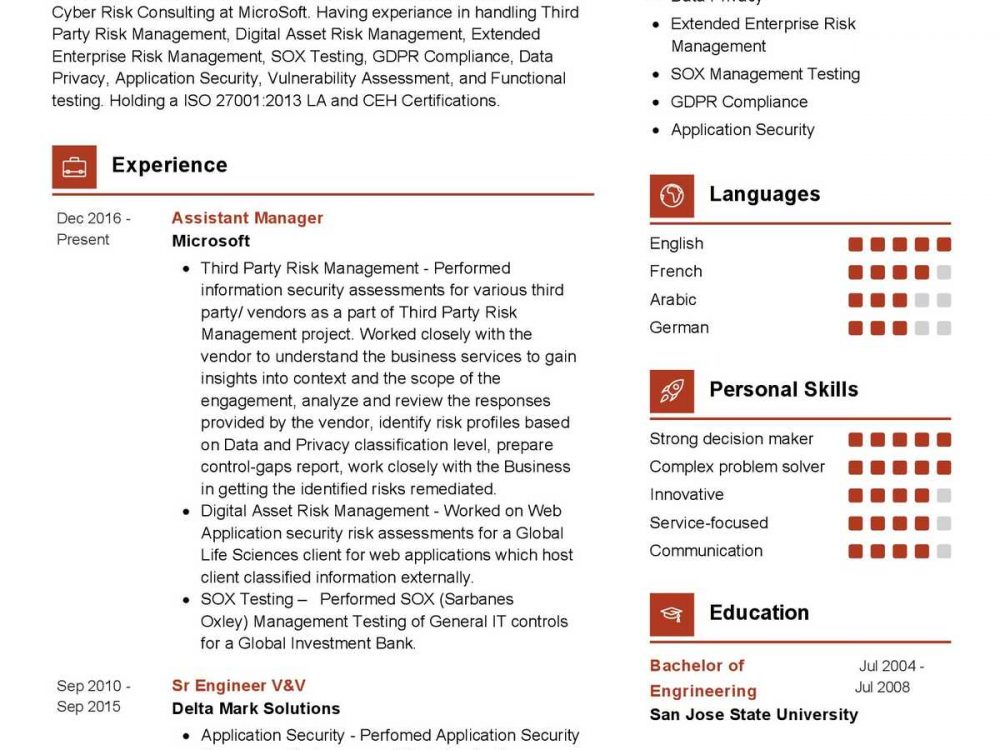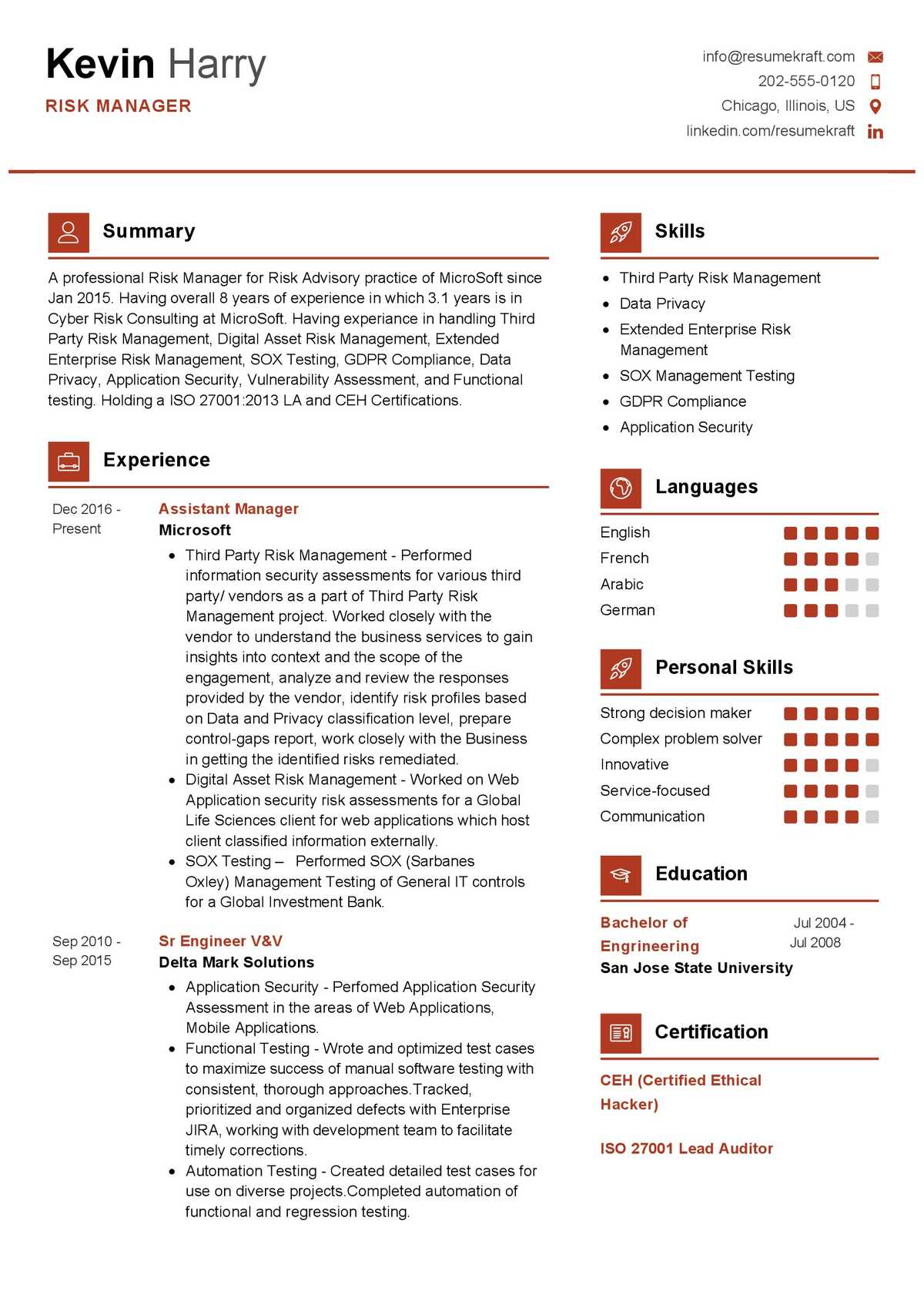Are you a Risk Manager by profession and looking for an exciting career? We have good news for you! use our professional Senior Risk Manager Resume Sample. You don’t have to start writing from scratch. Just click “Edit Resume” and modify it with your details. Update the template fonts and colors to have the best chance of landing your dream job. Find more resume samples.
Career Expert Tips:
- Always make sure you choose the perfect resume format to suit your professional experience.
- Ensure that you know how to write a resume in a way that highlights your competencies.
- Check the expert curated popular good CV and resume examples
The guide & tips to write a Risk Manager resume
A Risk Manager Resume is an important document that describes your experience in the risk management field. The objective of a resume is to introduce yourself and showcase your skills, accomplishments, and potential to employers.
Follow these easy steps to create a standout resume:
- Write out your experience in chronological order throughout the past five years;
- Customize with keywords relevant to the industry you are trying to enter (e.g. break things down into a Risk Manager resume template);
- Create a header using the name you were known by at each job;
- Use an appropriate font family in your resume in order to stand out from other resumes; and
- Choose a professional-looking font face.
Use this sample resume template to write your own resume which will help you to stand out from the crowd when applying for Risk Manager jobs. Simply adjust the main headings and personal information to suit your experience then fill in the details. This updated Risk Manager Resume is optimized for entry-level applicants with little or no previous work experience by showing off your personality through the use of personal details and achievements.
Risk Manager Job Description:
The role of a Risk Manager is to ensure that the risks posed to an organization are acceptable given the potential rewards. Their job is to measure the risk and return of assets, taking into account all possibilities of failure. It is important for a risk manager to be able to convey information in a manner that will keep employees engaged and committed throughout.
If you are interested in writing your own Risk Manager Resume take some time to review sample resumes provided by industry professionals. By simply reading through the resume format and being able to hear the main points being made you will be well on your way to writing a Resume that appeals to an employer.
Risk Manager Key Responsibilities:
- Develop risk management strategies for organizations
- Assist in the development of a Risk Management Systems (RMS) that will assist in calculating the risks associated with an organization’s financial assets and operational assets
- Verify proposed risk management strategies against existing RMS to ensure that they are consistent with the standards established by RMS
- Analyze and evaluate risks in order to make accurate predictions of potential financial losses
- Plan for mitigating outages on key assets
- Identify mechanisms for handling potential risks once they become apparent
Ultimately, a Risk. - Strategic thinkers who can handle the financial and operational aspects of risk management
- People who can apply broad knowledge across a number of different areas in order to resolve potential risks
- Analytical thinkers who are prepared to work with uncertainty and focus on.
Tips to write a Risk Manager Resume Summary:
- Ensure a strong Resume Objective. The most important piece of advice for a Risk Management resume is to write an effective Resume Objective. These are short statements that describe your skills and what type of job you are looking to fill.
- Write in an active voice. This is a technique that can easily be used to highlight your achievements. Using the active voice also means that it is easier to see how you have progressed in your career over time and make a more effective application.
- Stress Your Achievements. Take the opportunity to highlight examples of your achievements, even if they are not directly related to Risk Management, as employers will notice this more than the title or description on your resume. Use bullet points and use this opportunity to identify an employer’s key risk factors and highlight what you have managed.
Top 10 Risk Management Skills You Will need on the Job:
- Effective Decision Making – When making decisions, first you have to know what information is relevant to the decision and then use it appropriately.
- Effective Communication – When communicating with someone, you need to make sure that the information is conveyed accurately and in a way that will help the person understand what you’ve said.
- Critical Thinking – When making decisions, one has to be able to think things through and understand all potential outcomes.
- Effective Interpersonal Skills – When communicating with other people, it’s important for a person to have good communication skills so that you can convey information accurately and efficiently.
- Effective Leadership – When leading someone, one has to be able to communicate with them in a way that shows them you are interested in their ideas and opinions.
- Problem Solving Skills – You often need to solve problems that arise when making decisions and working with other people. You have to be able to think things through and then decide on the best solutions…
- Effectiveness at Handling Stress – When faced with stress, one needs the ability to deal with it effectively so that stress can be managed without causing damage or conflict.
- Good Organizational Skills – When working with other people to solve problems or complete a project, they need to have good organizational skills so that meetings and information aren’t missed.
- Self-Motivation – In order to deal with the stress of work and also help motivate others, self-motivation is an important skill to possess.
- Strong Problem-Solving Skills – In order for problem-solving processes to be effective, they must be carried out in a timely manner and effectively solved.
Tips to write a Risk Management resume with no experience:
- Contact people who have similar jobs to you and ask them what their experience has been like. This will help you begin to get the information you need as well as give you a better idea of what is required on your resume.
- Use simple language to break up sections and bullet points for key responsibilities, achievements and skills. This makes it easier for employers to read your resume and also allows you to highlight certain aspects more effectively.
- Use an appropriate format. When writing a Risk Management resume, one needs to make sure that the section headings are clear and well organized. This aids in making the process easier for employers to follow.
- Make sure that an appropriate amount of detail is included in each section. Not enough detail can be as bad as too much, so it’s always a good idea to have a look at other resumes before writing your own so you can see how much information to include.
- Make sure you use the correct language in each section. Make sure you use the correct names and titles for your key responsibilities and achievements.
- Keep the resume to a reasonable length. It’s best to have your resume less than one page long with two or three sections per page (the rest of the page will contain an introduction, summary, and contact details). This will make it easier for employers to read through and give them a good idea of what your experience has been like.
Tips to write a Risk Management Cover Letter:
- Your cover letter should be short and to the point allowing the employer to understand quickly what your skills are and what you can offer.
- Be clear in your cover letter which job you are applying for. If you don’t include this, the employer may think that you are applying for other positions instead of the one you have highlighted in your application.
- Be specific about why you want to work at this company and what makes them a good company to work with.
- If the job listing asks for a cover letter, make sure you send one even if the ad doesn’t ask for it. This will show that you have taken detailed measures to carefully sift through the job listing and make sure you have met all requirements needed to apply.
- Be sure to have someone else proofread your cover letter before sending it out, as sometimes typos can lead to false meanings being portrayed.
Conclusion:
Finally, in this article, we learn the art of writing a resume tailored for your industry and your skills. We also ask you to write a cover letter to go along with your resume as well as an Action Plan Statement which will help readers understand how committed and eager YOU are to take on the position.


